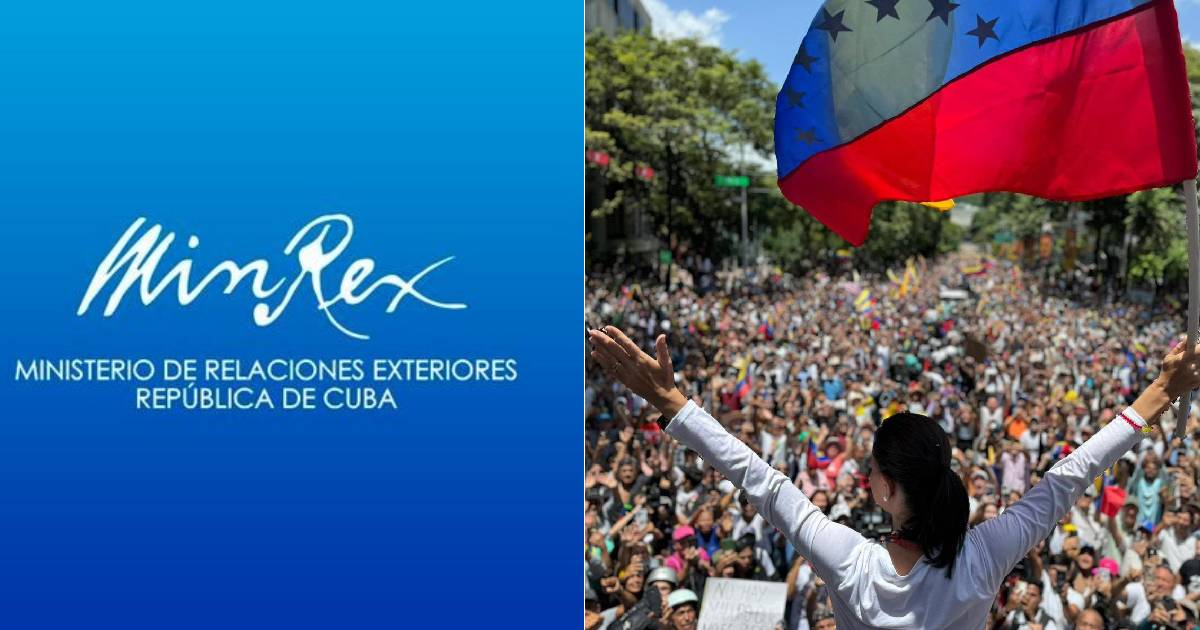The Ministry of Foreign Affairs of Cuba (MINREX) denied on Friday any movement of personnel and documentation to Caracas, the capital of Venezuela, following Sunday, July 28, when Nicolás Maduro claimed victory in controversial elections in the South American country.
"The Declaration of the Ministry of Foreign Affairs on July 31, 2024, condemned the Venezuelan people's struggle against media and political manipulation, imperialist harassment, foreign interference, and opportunistic attacks by oligarchies and their representatives," MINREX stated in a release. The ministry referred to an earlier note reaffirming their alignment and recognition of Maduro's proclamation for a third presidential term (2025-2031).
The Cuban ministry also highlighted the support from the Union of Journalists of Cuba, affiliated with the Communist Party, regarding the dissatisfaction caused by Maduro's election, recognized only by allied nations such as Russia, China, Nicaragua, Qatar, Honduras, and Cuba, among a few others.
However, they pointed out that "it did not take long for media and political manipulation to attempt to impose a slander involving Cuba." The government entity denounced what they called "a gross fabrication by the Diario de las Américas, consistent with its editorial line on Cuba," regarding the alleged transfer of Cuban personnel to Venezuela to support Maduro's presidency.
"It was expected that other media outlets and digital platform accounts, which work in coordinated campaigns to distort Cuban reality, would accept this slander as truth without verifying it," they asserted.
The authorities cited a series of flights by various airlines, confirmed by the state-run Cuban Institute of Civil Aeronautics, stating that "only pre-scheduled commercial flights occurred" between July 28 and August 2, 2024.
"One of the lies in this slander included the claim that aircraft transported personnel to guard and protect Venezuelan government leaders and specialized staff to print new electoral ballots and brought back Cuban medical personnel and other advisors to protect their lives due to the violence that had erupted," they noted.
Nonetheless, they categorically affirmed that "no personnel linked to security operations or protection of Venezuelan leaders traveled from Cuba nor to perform any tasks associated with the electoral process. No Cuban collaborators working in Venezuela were relocated to Cuba due to security concerns; instead, the normal and planned movement of Cuban cooperation members in Venezuela continued."
It should be recalled that the Cuban government, even before the election results were out, had already congratulated Maduro on his electoral win.
"General of the Army Raúl Castro Ruz had a phone conversation with comrade Nicolás Maduro Moros to congratulate him on the electoral victory achieved in the elections held today in the Bolivarian Republic of Venezuela," MINREX stated in a release last Monday.
The appointed leader Miguel Díaz-Canel also defended his regional ally in the face of the international community's lack of recognition and allegations of electoral fraud.
"Cuba Denounces: Those who cried fraud before the elections; those who disqualify Nicolás Maduro's triumph without arguments; the coup plotters and the current guarimberos are on the side of those who hate and destroy, the enemies of Venezuela and Our America," Díaz-Canel expressed on the social network X (formerly Twitter).
On Friday, Venezuelan opposition leader María Corina Machado called for popular mobilization on Saturday, August 3, following the Maduro government's electoral fraud.
Key Questions About Cuba's Denial of Personnel and Document Transfer to Caracas
In light of the Cuban government's recent denial of allegations concerning the transfer of personnel and documentation to Caracas, several questions arise. Below are some key queries and their answers to provide clarity on the matter.
What did MINREX deny regarding the movement of people and documents to Caracas?
MINREX denied any movement of personnel and documentation to Caracas following the controversial elections in Venezuela on July 28, stating that only pre-scheduled commercial flights occurred during that period.
Which countries recognized Nicolás Maduro's election victory?
Maduro's election victory was recognized by allied nations including Russia, China, Nicaragua, Qatar, Honduras, and Cuba.
What was the Cuban government's response to allegations of transferring personnel to Venezuela?
The Cuban government categorically denied transferring any personnel linked to security operations or related to the electoral process in Venezuela, asserting that no Cuban collaborators were relocated due to security concerns.
How did Miguel Díaz-Canel defend Nicolás Maduro?
Miguel Díaz-Canel defended Nicolás Maduro by condemning those who disqualified Maduro's victory without evidence and labeling them as enemies of Venezuela and Our America.
